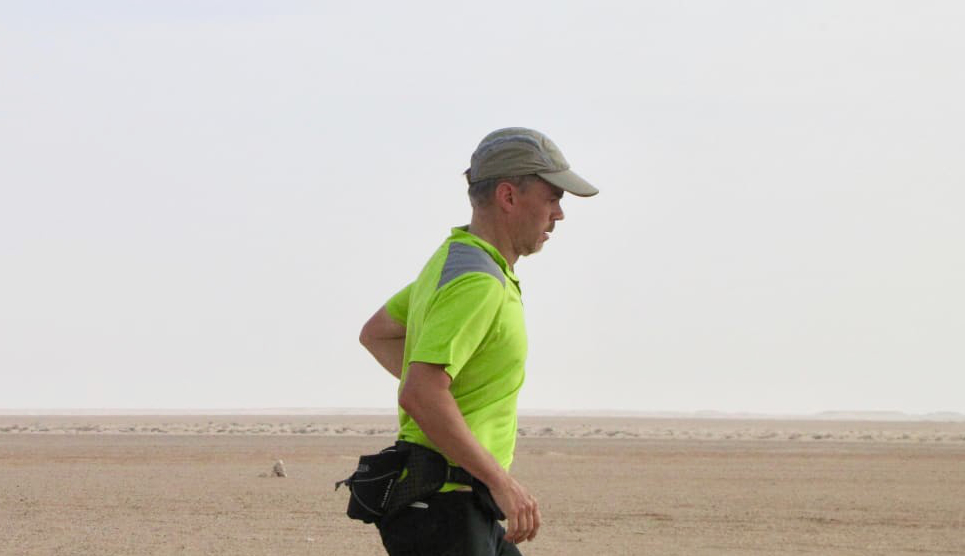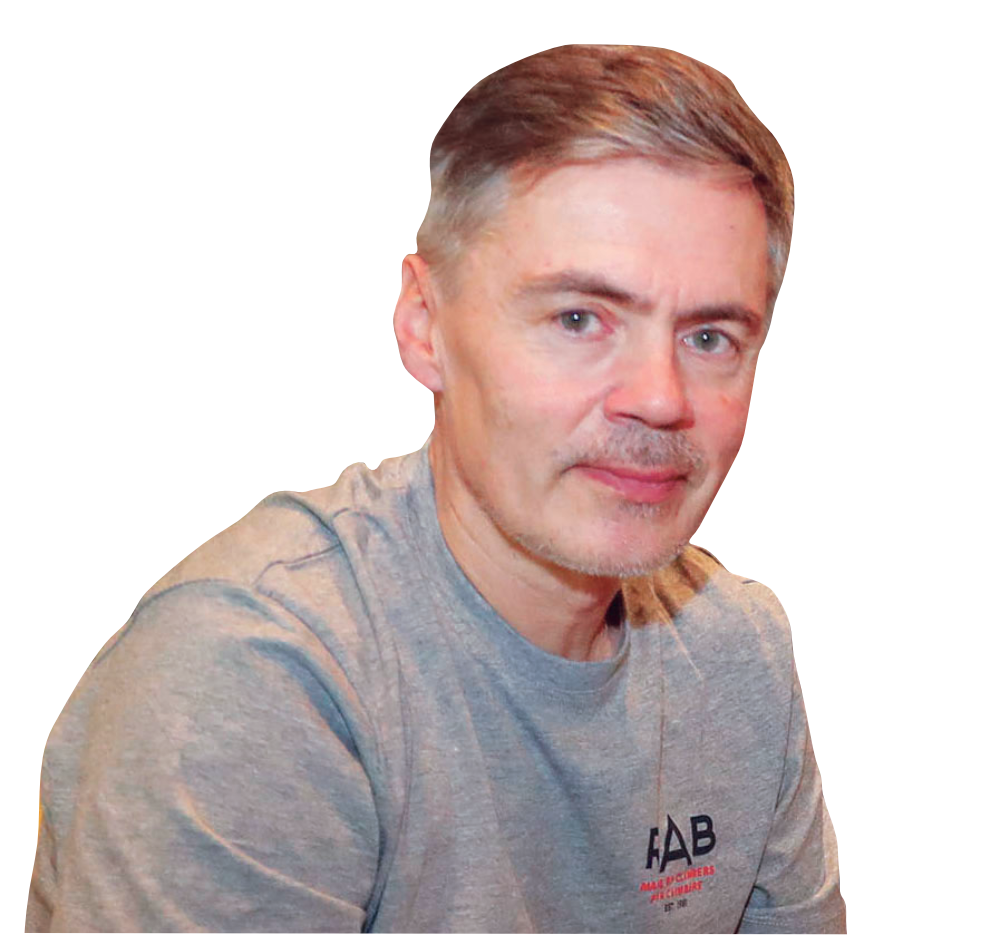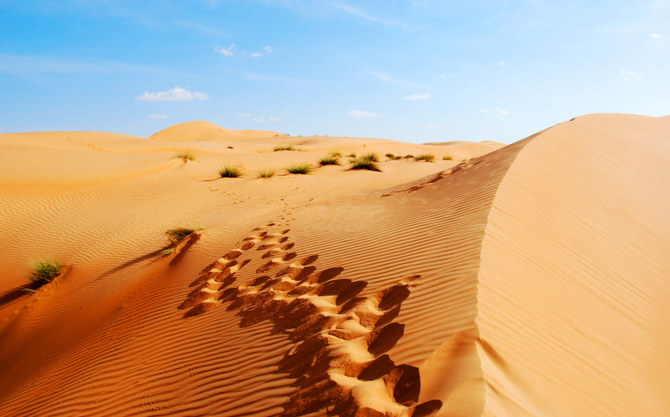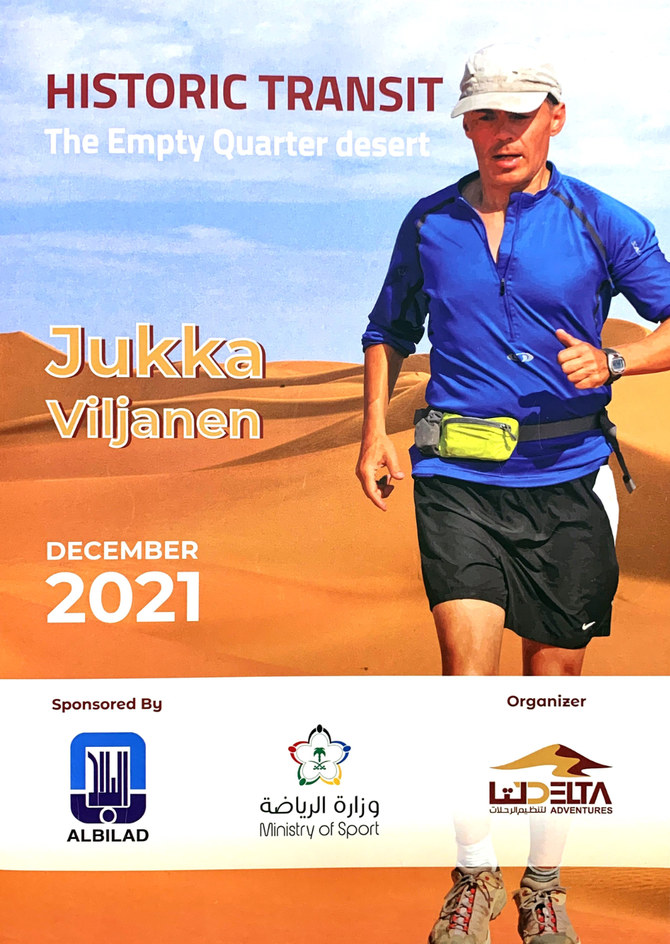RIYADH: A Finnish adventurer has set himself the challenge of joining the ranks of record-breaking pioneers who have made the grueling journey across Rub Al-Khali, Saudi Arabia’s Empty Quarter. Adventure runner Jukka Viljanen will set off on Dec. 6 on a 25-day journey through 1,300 km of desert terrain, with the aim of becoming the first person to run across the massive desert.
The Empty Quarter is the world’s largest uninterrupted sand mass, covering most of the southern third of the Arabian Peninsula. The vast landscape of ever-shifting dunes was explored between the early 1930s and the 1950s by the likes of Bertram Thomas, the first recorded Westerner to cross the desert, and Wilfred Thesiger, and their Arab companions.
More recently, photographer Anna Aiko crossed Rub Al-Khali on camel in 2019, and Italian explorer Max Calderan, a long-time resident of Dubai, completed the first solo crossing of the Empty Quarter in 2020. Previous explorers have crossed shorter sections of Rub Al-Khali on camels or in off-road vehicles.
Given the inhospitable terrain and testing conditions, the journey is a test of endurance however it is undertaken but Viljanen aims to take the challenge to another level by running the whole way, covering about 50 kilometers a day. His challenge has been organized by Delta Adventures, a leader in desert journeys and adventures in Saudi Arabia.

Finnish adventure runner Jukka Viljanen (file photo)
“I started as an adventure runner 15 years ago,” Viljanen said during an exclusive interview with Arab News. “I am very passionate about the sand dunes; they energize me. I love the desert.
“It has become a challenge for me as the Empty Quarter has not been crossed fully yet. I want to make it with my team. I am very passionate about creating history by crossing it successfully.
HIGHLIGHT
Given the inhospitable terrain and testing conditions, the journey is a test of endurance however it is undertaken but Jukka Viljanen aims to take the challenge to another level by running the whole way, covering about 50 kilometers a day. His challenge has been organized by Delta Adventures, a leader in desert journeys and adventures in Saudi Arabia.
“This dream to run across the Empty Quarter has been my passion. I am very passionate about it because Rub Al-Khali is the biggest and the most beautiful sand desert in the world, it inspires me. My passion keeps me motivated to run for adventure. It’s my passion that brought me here.”
Viljanen said he chose Dec. 6 as the start date for his adventure for a special reason: “It’s the Finnish National Day.”
The expedition will be his first experience of running in the Empty Quarter, though has run in other Saudi deserts. In fact he has run in a number of challenging environments around the world.
“In 2007, I went to the North Pole where I participated in a marathon with snowshoes,” he said. “Then I did another marathon with a mountain bike.
“After the North Pole I decided to challenge myself more so I entered another race, which was in the Libyan Sahara in 2008. I did a 200km race over there. Then I went to Antarctica, the southernmost continent and site of the South Pole
"Some years later, I decided to run across (more) deserts. My first event was at the Kalahari Desert in 2010.”

I am very passionate about the sand dunes; they energize me. I love the desert. Jukka Viljanen
Viljanen ran across more than 1,000 km of the Kalahari in 20 days, including some of the most remote wilderness areas in Botswana.
“A few years later I was the first one to run across the Sahara Desert, which was 1,628 km in 31 days,” he added. “Two years ago I was able to run across the second-biggest ice sheet in the world … across the icecap of Greenland. That was approximately 600 km.”
His experiences and achievements are remarkable but he has no intention of stopping any time soon — quite the opposite.
“I want to go further and out of my comfort zone,” Viljanen said. “I want to raise the bar for myself, and that’s the reason I am here in Saudi Arabia: I want to be the first person to run across the Empty Quarter.”
He will run alone but will be accompanied by a backup team consisting of Saudis and a friend from Finland. The team leaders are Mohammed Al-Khamis and Ady Al-Khamis, the owners of Delta Adventures.
“I have known them since 2014, when I was here in Riyadh for the first time,” said Viljanen “They have been to the Empty Quarter before. I consider them my extended family.”
The climate in Saudi Arabia is a lot different to his native Finland but Viljanen is taking it all in his stride.
“Yes, it’s a lot warmer but I am quite used to it because of my experiences in the Sahara and Kalahari deserts,” he said. “I like that it’s warm, I take that as a bonus.”
He said he hopes he will have a chance to talk to young people in Saudi Arabia to share his experiences and help inspire them in their own lives and ambitions.
“I would like to speak to the Saudi people after the voyage,” Viljanen said. “I will be back here to share my story. People should raise their bar and they should have new goals in their lives, coming out of their comfort zone. It cannot be achieved sitting in their comfort zone. People have lots of potential but they don’t know it; we should motivate them to become role models for others.
“The main message is ‘challenge yourself.’ I am a motivational speaker and will give motivational talks to Saudi students and people to inspire them to accept the challenge and get out of their comfort zone, because the magic happens outside of the comfort zone. The Empty Quarter is not a comfort zone; the magic will happen there.”
This visit is Viljanen’s fifth to Saudi Arabia, and he said he is always impressed by Saudi traditions and the reception he receives.
“Besides my passion to run, I want to learn about new cultures,” he added. “I am amazed by the warm hospitality of the Saudi people. I attended a Saudi wedding ceremony on Wednesday. It was a blessing. I joined them in traditional dance and enjoyed it.”
It remains to be seen how his Empty Quarter challenge will compare to previous tests, but he is clear about what has been his most difficult undertaking so far.
“It was Greenland,” Viljanen said. “Crossing the ice sheet in 2019 was very difficult. It was full of snow and very cold. The terrain was really very difficult but it was very rewarding. I realized that I have potential, and here I am because of my North Pole experience.”
If running across the ice was his most challenging test, deserts present their own challenges.
“Sand makes it tough,” he explained. “It can ruin your legs so you really need to focus on taking care. Hot weather is another challenge but I keep myself very much hydrated. I drink every 20-30 minutes. I keep myself energized by eating every hour so my sugar level does not drop.”





































